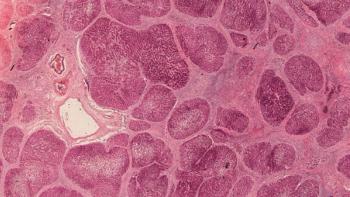
The FDA has added a boxed warning for fezolinetant (VEOZAH; Astellas), highlighting the rare occurrence of serious liver injury in patients taking the menopause treatment.

The FDA has added a boxed warning for fezolinetant (VEOZAH; Astellas), highlighting the rare occurrence of serious liver injury in patients taking the menopause treatment.

Persistent hot flashes and/or night sweats are significantly linked to up to a 50% increased risk of developing diabetes.

A meta analysis highlights how kinesiotherapy post-breast cancer surgery may significantly improve patient quality of life.

A population-based time-series analysis California before, during and after legalization show a rising trend in women using cannabis while pregnancy especially when the state has legalized the drug.

New data from SMSNA 2024 show transplant recipients face a 17% reduced risk of poor sexual function outcomes after procedure.

Reunion Neuroscience is enrolling patients in its phase 2 RECONNECT trial to assess a single-dose synthetic psychedelic to treat the depressive symptoms of PPD.

In this 4-part interview, Kingsberg discusses the phase 2 RECONNECT trial assessing RE104 as the potentially first psychedelic to treat postpartum depression.

A retrospective analysis of postpartum hemorrhage cases shows the noninvasive procedure may be a simplistic and highly effective mean to reduce bleeding.

The over-the-counter, at-home test provides blood results in 15 minutes that could help result in sooner syphilis diagnoses.

A case series study shows women with absolute uterine-factor infertility who achieve a successful graft survival from uterus transplants may have greater conception success.

An analysis from Harvard shows there is no significantly increased newborn risk when continuing metformin to treat type 2 diabetes in pregnant women.

New research reveals that while nearly 1 in 5 sexual and gender minority youths experience changes in gender identity, these changes do not correlate with increased depressive symptoms.

New data from Kaiser Permanente suggest teenagers with autism were 31% less likely to make any ob/gyn visit, and were up to 3-fold more likely to be diagnosed with a gynecologic condition.

National survey data presented at ACOG 2024 shows many medical students applying for OB/GYN residencies prioritized states with abortion access.

New ACOG 2024 data suggest SARS-CoV-2 in the early stages of pregnancy can lead to a higher likelihood of preeclampsia, as well as more severe disease.

A pair of studies from AUA 2024 show neither drinking nor vaping by either parent is associated with significantly increased risk of a spontaneous abortion.

Jenell Stewart, DO, MPH, discusses her team's qualitative research into the STI prevention tendencies and interests of at-risk women.

New data show women of specific race and ethnicity may more be adversely affected by the changing state-level laws on abortion access.

Jenell Stewart, DO, MPH, discusses the factors impacting the poor uptake of potential STI prophylaxes including doxycycline.

A recent regression model analysis unveils a 5% prolonged period to menopause in women with polycystic ovary syndrome, prompting further investigation into the condition's impact on reproductive health and the need for diverse longitudinal studies.

A recent systematic review highlighted a half-dozen methods to improve antenatal STI screening in low- and middle-income countries in need of better options.

A randomized trial among young Kenya women showed the post-exposure prophylactic was insignificantly more effective in preventing chlamydia, gonorrhea and syphilis—largely due to inadherence.

A cohort analysis suggests autism may be poorly diagnosed among expectant mothers—and linked to poor birth outcomes.

An analysis of postmenopausal women shows a nearly two-fold increase in liver cancer incidence among those who consume at least 1 soft drink or fruit drink daily.

Approximately 1 in 5 newly diagnosed patients are initiating direct acting antivirals within 6 months, according to Medicaid data review.

New cross-sectional data show the sex gap in alcohol-related mortality has been narrowing since 1999, as women have become more susceptible to alcohol use and related diseases.

New meta-analysis show patient demographics—as well as their pre-existing comorbidities and COVID-19 vaccination status—may significantly define their risk of long-term conditions.


Published: January 24th 2024 | Updated:

Published: November 11th 2024 | Updated:

Published: October 16th 2024 | Updated:

Published: August 16th 2024 | Updated:

Published: February 20th 2019 | Updated: